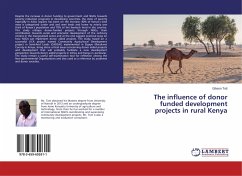
The Influence of Materialism on Consumption Indebtedness
A study of low income consumers from the city of Sao Paulo, Brazil
Versandkostenfrei!
Versandfertig in 6-10 Tagen
39,99 €
inkl. MwSt.

PAYBACK Punkte
20 °P sammeln!
Income distribution in Brazil is highly unequal and, although consumption at the bottom of the pyramid has increased in the last years, there are millions of individuals living at the margins of a fast growing consumer society. In this book, the influence of materialism (defined as the importance attributed to the possession and acquisition of material goods) on consumer indebtedness is investigated within a context that is characterized by poverty and by high interest rates, limited access to credit and to quality affordable goods. It is argued that not only adverse economic factors lead peop...
Income distribution in Brazil is highly unequal and, although consumption at the bottom of the pyramid has increased in the last years, there are millions of individuals living at the margins of a fast growing consumer society. In this book, the influence of materialism (defined as the importance attributed to the possession and acquisition of material goods) on consumer indebtedness is investigated within a context that is characterized by poverty and by high interest rates, limited access to credit and to quality affordable goods. It is argued that not only adverse economic factors lead people to get into debt; and that the study of demand for credit for consumption purposes must include variables of a psychological nature. It is suggested that the low income materialistic consumers experience feelings of powerlessness and exclusion because of the gap that exists between their possessions and their desires. Lines of conduct to combat this marginalization from the consumer society are drawn targeting marketing professionals, public policy makers and vulnerability researchers.












